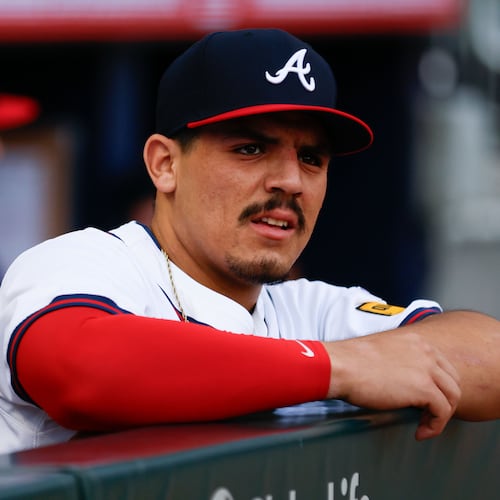Before Sunday night, only two pitchers — both now in baseball’s Hall of Fame — had started Game 7 of a playoff series for the Braves since the franchise moved to Atlanta 54 years ago.
Ian Anderson joined the group that previously included only John Smoltz and Tom Glavine.
The 22-year-old rookie right-hander pitched three stressful innings in Game 7 of the National League Championship Series against the Los Angeles Dodgers. He allowed two runs and five hits, walked two and struck out two. He needed 73 pitches to get through three innings, 43 strikes and 30 balls.
“I wish I could have been out there a little bit longer and given the team a little bit more,” Anderson said later.
The runs against him came in the third inning, tying the score 2-2, and broke his 18-1/3-inning postseason scoreless streak, the second-longest such streak by a rookie in the past 100 years.
It wasn’t the Game 7 start of his dreams, but it was sufficient to keep his team in the game and, after the Braves scored one run in the top of the fourth, hand over a 3-2 lead to the bullpen.
Alas, relievers A.J. Minter and Chris Martin gave up solo home runs to Enrique Hernandez and Cody Bellinger in the sixth and seventh innings, respectively, and the Dodgers beat the Braves 4-3 to land the National League’s berth in the World Series.
“At the end of the day, I felt like I left everything out there,” Anderson said. “I know everyone in the locker room left everything out there.”
At 22 years and 169 days old, Anderson became the sixth-youngest pitcher to start a Game 7 in MLB postseason history and the youngest since Cleveland’s Jaret Wright started Game 7 of the 1997 World Series at 21 years, 301 days old.
The game started stressfully for Anderson with a single by Dodgers leadoff batter Mookie Betts, who advanced to second base on ground-ball out. Anderson retired the next two batters, striking out Max Muncy with a changeup to end the first inning.
Anderson encountered more difficulty in the second inning, when back-to-back two-out singles and a passed ball put runners on second and third bases. But with Betts on deck, Anderson threw a full-count changeup that struck out Chris Taylor to end the inning.
Anderson’s postseason scoreless streak ended when the Dodgers, trailing 2-0, rallied with two out in the third. After getting Betts and Corey Seager out to start the inning, Anderson invited the trouble by walking Justin Turner after getting ahead of him 1-2 in the count. A double by Muncy off a fastball on another 1-2 count placed runners at second and third bases, both of whom scored on a single to right-center by Will Smith off a curveball, tying the score. Anderson got out of the inning on a lineout to center field by A.J. Pollock, the last batter he would face.
This was Anderson’s postgame synopsis of that inning: “I had a chance to put Turner away. I kind of let him get back in the at-bat and ended up walking him. The same kind of thing with Muncy — I was able to get ahead of him, and he put a good swing on that pitch and hit it down the line. Smith had a good at-bat, too. Good situational hitting for them. That’s just the way it goes sometimes.”
Credit: Atlanta Braves
Said Braves manager Brian Snitker: “He was just getting a little erratic. ... He was kind of having trouble commanding some things, his fastball, and even a few of the changeups were out. He was off a little bit. That’s OK. ... He’s only given up two runs in his whole postseason career so far as a major-leaguer. ... The kid had an unbelievable year, an unbelievable postseason."
The idea of Anderson starting Game 7 of the NLCS would have seemed far-fetched when, less than two months ago, he was pitching against other prospects in intra-squad games at the Braves' alternate training site.
But after he made nine impressive starts — six late in the regular season, three in the postseason — the Braves put him in the elite company of the franchise’s Game 7 starters.
Smoltz started three such games and pitched superbly in all of them. As a 24-year-old in his third full big-league season, Smoltz pitched a six-hit shutout as the Braves defeated Pittsburgh 4-0 in Game 7 of the 1991 NLCS. He allowed two runs in six innings before the Braves came from behind in the ninth to beat Pittsburgh 3-2 in Game 7 of the 1992 NLCS. And he pitched 7-1/3 scoreless innings in 1991 World Series Game 7, which the Braves lost to Minnesota 1-0 in 10 innings.
The Braves’ only other Game 7 in their Atlanta era before Sunday night was in the 1996 NLCS against St. Louis. Glavine, then 30, pitched seven scoreless innings in that game, which the Braves won 15-0.
Before the Braves moved to Atlanta, they played in only two Game 7s, those in the 1957 and 1958 World Series. Lew Burdette was the Milwaukee Braves' starting pitcher in both of those games.
The Braves got within one win of the 2020 World Series despite losing all but one member of their projected starting pitching rotation. Anderson was a big part of how the Braves overcame such attrition to get to Game 7 of the NLCS. After Sunday night’s season-ending loss, Snitker spoke to the team.
“He told us he loved us and that he had a blast managing this team this year,” Anderson said. “I think you can tell that."
About the Author
Keep Reading
The Latest
Featured



